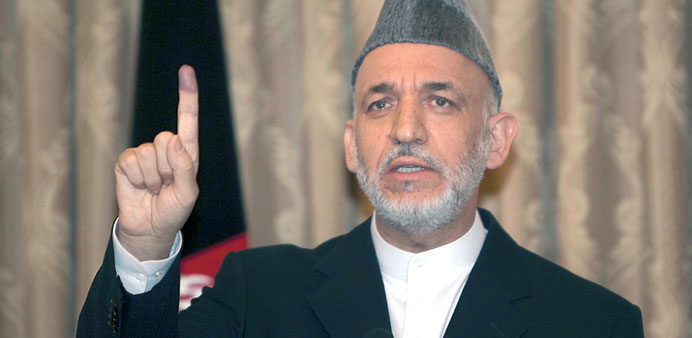Reuters/Kabul
Afghan President Hamid Karzai demanded yesterday that Britain hand over within two weeks more than 80 prisoners of war being held in a British base in the south, saying the detention was against Afghan law and a breach of sovereignty.
The issue of prisoner transfers is an irritant in the relationship Karzai between and his Western backers, and has become more pronounced as the Nato-led international force prepares to pull out most of its troops by the end of next year.
Last month, a British legal firm said the detention of up to 85 Afghans for as long as 14 months in the British-controlled Camp Bastion in Helmand province was in breach of British and international law.
The British government has cited concerns about Afghanistan’s treatment of detainees and denied that claim.
On Saturday, Karzai’s national security adviser, Rangin Datfar Spanta, wrote to the British Embassy in Kabul and asked for the detainees to be handed over by June 22, said a statement from Karzai’s spokesman, Aimal Faizi.
“Continuing the detention of Afghan nationals by British forces will be a violation of our national sovereignty and our country’s laws,” Faizi said.
The British embassy said in a statement it had not yet seen Karzai’s message . It “fully supported” transferring detainees as quickly as possible to Afghan custody, but wanted assurances they would be treated well.
“It has been the threat of UK court action that has prevented us from transferring detainees to the Afghan authorities since last November,” the statement said.
“In resuming the transfer of UK captured detainees to Afghan custody, we must be satisfied that they do not face a real risk of serious mistreatment or torture.”
Britain it said had been working with Afghanistan as a priority “to identify a safe transfer route”.
Foreign rights groups occasionally accuse the Afghan state of using torture and abuse, while Kabul says Western nations rely on questionable international legal principles to detain Afghans without access to Afghanistan’s courts.
Numerous countries fighting in the US-led war in Afghanistan continue to hold Afghan detainees. Last month Australia, which operates a force in the southern province of Uruzgan, announced it was suspending transfers of prisoners to an Afghan facility due to allegations of mistreatment.
In November, British Defence Secretary Philip Hammond imposed a ban on transferring suspects to Afghan forces due to concerns over ill treatment. He added that the detainees were suspected of killing British troops and planting roadside bombs.
Camp Bastion houses around 30,000 staff and is the largest British military base in Afghanistan.
On May 31, the UN anti-torture watchdog urged Britain to widen and speed up investigations into alleged torture of detainees in Iraq and Afghanistan by British troops, and prosecute those responsible.
Afghan President Hamid Karzai yesterday visited Qatar for talks with officials in the wealthy Gulf state that could host future peace negotiations between the Afghan government and Taliban insurgents.
With US-led Nato combat troops due to withdraw from Afghanistan by the end of 2014, Karzai recently backed a proposal for the Taliban to open an office in Doha, the Qatari capital.
The militants refuse to have direct contact with Karzai, saying he is a puppet of the United States, which supported his rise to power after the military offensive that ousted the Taliban from power in 2001.
During the visit, the president was to meet Qatari officials “to discuss Afghanistan’s peace process and bilateral relations between the two countries”, Karzai’s office said in a statement.
The Afghan president had previously opposed a Taliban office in Qatar due to fears that his government would be frozen out of a peace deal involving the Islamic extremists and the US.
But in the television interview during his last visit to Qatar in March, Karzai said a Taliban office in Doha could pave the way for “direct contacts” and push forward the peace process.
Any peace talks still face numerous hurdles before they begin, including confusion over who would represent the Taliban and Karzai’s insistence that his appointees should be at the centre of negotiations.

